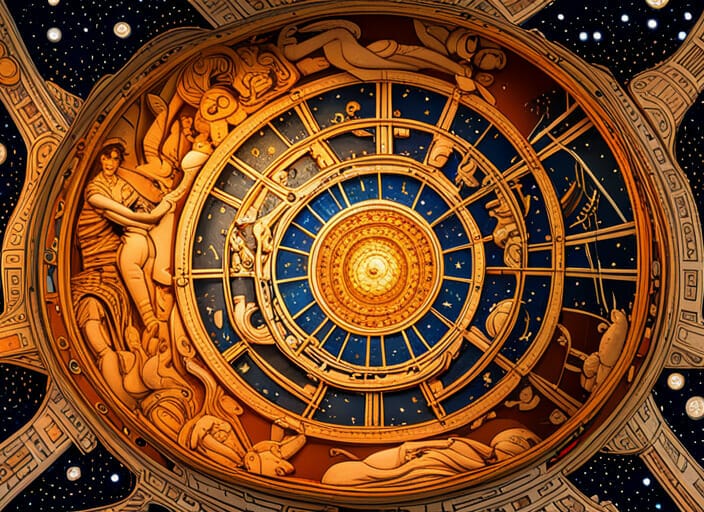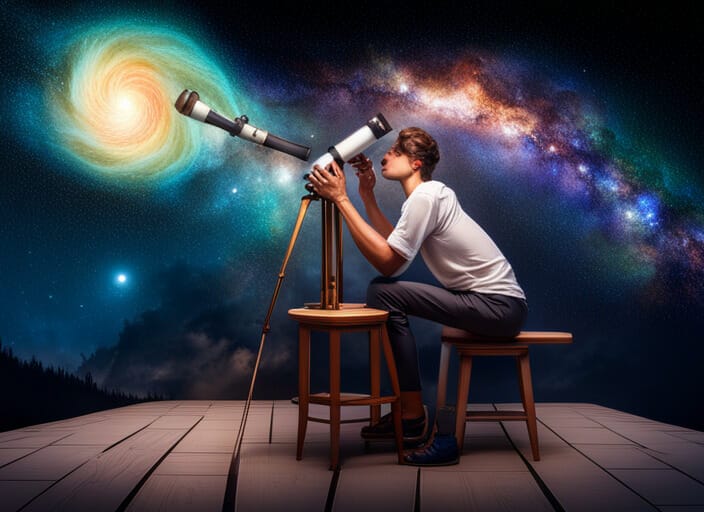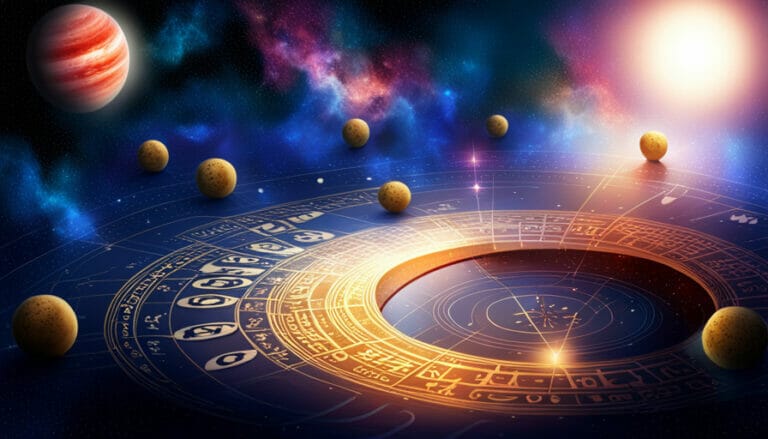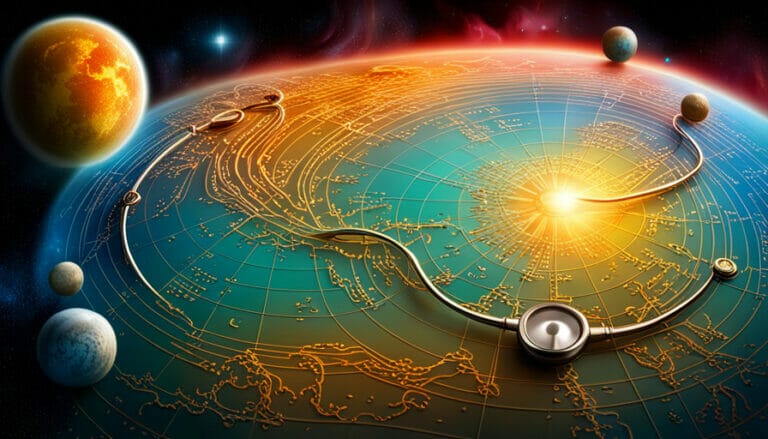Is Astrology A Science?
Are you curious about astrology and its validity as a science? Imagine this scenario: you have a friend who swears by their horoscope, claiming it accurately predicts their daily experiences and influences their decisions. Meanwhile, you remain skeptical, unsure if astrology truly holds any scientific merit.
In this article, we will explore the question, ‘Is astrology a science?’ by examining its historical origins, scientific principles, skepticism and criticism, as well as its role in popular culture and media. By delving into these aspects, we can better understand the ongoing debate surrounding astrology’s legitimacy as a scientific field.
So, whether you are a firm believer in the power of the stars or someone who questions the validity of astrology, this article aims to provide you with a comprehensive analysis of the subject, allowing you to form your own informed opinion.
Key Takeaways
– Astrology is a popular and enduring practice that has captivated people for centuries.
– Despite its popularity, astrology lacks scientific validity and empirical evidence to support its claims.
– Controversy and skepticism surround astrology due to its reliance on subjective interpretations and the absence of rigorous scientific methodology.
– The debate about astrology’s legitimacy continues, highlighting the importance of evidence-based practices and critical thinking in evaluating the claims of divination practices.
Historical Origins of Astrology

So, you’re probably wondering about the historical origins of astrology, huh? Well, let me tell you, it all started way back in ancient Mesopotamia.
The people of this civilization believed that celestial bodies, such as the sun, moon, and planets, had a profound influence on human affairs. This belief led to the development of astrological practices, where individuals would study the movements and positions of these celestial bodies to make astrological predictions.
Over time, astrology spread to different cultures, such as ancient Greece and Rome, where it became intertwined with religion and philosophy.
However, it’s important to note that while astrology has a rich historical background, it is not considered a science. Nonetheless, understanding the historical origins of astrology is crucial to comprehending the scientific principles that underpin it.
Scientific Principles in Astrology

In this discussion, you’ll explore the scientific principles behind astrology. There are two key points to focus on: the influence of celestial bodies and the use of astrological charts for interpretations.
First, let’s analyze how celestial bodies such as the sun, moon, and planets are believed to exert their influence on human behavior and events.
Next, we’ll delve into the process of creating astrological charts. These charts are used to gain insights into an individual’s personality traits and life events. We’ll also discuss how these charts are interpreted to provide meaningful information.
By understanding these scientific principles, you’ll gain a deeper appreciation for the role astrology plays in our lives.
Celestial Bodies and Their Influence
The moon’s gravitational pull affects tides and is believed to influence human emotions according to astrology.
Celestial bodies like the moon, sun, and planets are considered to emit cosmic energy that can have an impact on our lives.
Astrology suggests that the positions and movements of these celestial bodies at the time of our birth can provide insights into our personalities, behaviors, and even our future.
The moon, for example, is associated with our emotions, intuition, and subconscious mind. It is said to influence our moods, feelings, and reactions to certain situations.
Understanding the influence of celestial bodies allows astrologers to create astrological charts and interpretations that can help individuals gain a deeper understanding of themselves and navigate their lives more effectively.
This knowledge serves as a foundation for the subsequent section on astrological charts and interpretations, which delve into the specifics of these tools and their significance in astrology.
Astrological Charts and Interpretations
Astrologers use birth charts to interpret the positions of celestial bodies at the time of a person’s birth. This allows them to gain insights into their personality traits and potential life paths. Birth charts provide a detailed snapshot of the positions of the sun, moon, planets, and other celestial bodies at the exact moment of birth. By analyzing these positions and their relationships, astrologers can make interpretations about an individual’s character, strengths, weaknesses, and even potential future events. Some key elements of astrological charts include:
– Sun sign: Represents the core personality traits and ego.
– Moon sign: Reflects emotions, instincts, and subconscious mind.
– Rising sign: Indicates how others perceive an individual.
– Planetary aspects: Relationships and interactions between celestial bodies.
– Houses: Areas of life where different energies manifest.
Astrological charts and their interpretations provide a comprehensive understanding of a person’s unique makeup and life potential.
However, skepticism and criticism of astrology arise due to various factors, which will be explored in the subsequent section.
Skepticism and Criticism of Astrology

Although many people are skeptical of astrology, there are valid criticisms that question its scientific validity.
Skepticism versus belief is a fundamental aspect of any scientific discipline, and astrology is no exception. Critics argue that astrology lacks scientific evidence to support its claims. They point out that astrological predictions often rely on vague and general statements that can apply to anyone, making them difficult to falsify or verify.
Additionally, the lack of consistent and replicable results in astrological studies adds to the skepticism surrounding the practice. However, it is important to note that skepticism alone does not disprove astrology. Psychological and personal belief in astrology can offer alternative explanations for the popularity and enduring appeal of this ancient practice.
Psychological and Personal Belief in Astrology

Psychological and personal belief in astrology taps into the depths of our souls, intertwining our hopes and dreams with the celestial dance of the universe.
Many individuals find comfort and solace in astrology, believing that the positions of the stars and planets at the time of their birth can provide insight into their personality traits, strengths, and weaknesses. This belief system can have a profound impact on mental health, as it offers a sense of guidance and purpose.
Moreover, astrology can influence decision-making processes, as individuals may consult their horoscopes or seek astrological guidance when faced with important life choices. While scientific evidence may not support astrology’s claims, its influence on personal belief and decision-making cannot be denied.
This intertwining of astrology and the human psyche sets the stage for its prevalence in popular culture and media, where its influence continues to captivate and enchant.
Astrology in Popular Culture and Media

Astrology’s presence in popular culture and media can be seen in the daily horoscope columns, astrology-themed movies, and the fascination with zodiac signs. People turn to their horoscopes in newspapers or online platforms to gain insights into their future, relationships, and personal traits. These horoscopes claim to provide guidance based on the alignment of celestial bodies at the time of a person’s birth. In the realm of entertainment, astrology has also found its place. Movies like “Zodiac” and “Stardust” have explored the mystical aspects of astrology, captivating audiences with their magical narratives. The fascination with zodiac signs is evident in the popularity of astrology-themed merchandise, such as jewelry and clothing adorned with zodiac symbols. This widespread presence of astrology in popular culture and media highlights its enduring appeal and the curiosity it sparks among people. However, the question remains: is astrology a legitimate science?
The Debate Continues: Is Astrology a Legitimate Science?

The debate continues: is astrology a legitimate science?
Astrology has a significant impact on society, with millions of people relying on it for guidance and insight into their lives. However, when it comes to its scientific validity, astrology falls short. Astrology is primarily seen as a form of divination, using celestial bodies and their positions to make predictions about individuals’ personalities and future events.
While astrology may offer comfort and entertainment for many, it lacks the empirical evidence and rigorous testing required for a practice to be considered a legitimate science. Despite its popularity, astrology remains a controversial topic among scientists and skeptics who argue for the importance of evidence-based practices in understanding the world around us.
Frequently Asked Questions
How accurate are astrological predictions?
Astrological predictions can vary in accuracy. While some people believe in their reliability, scientific evidence suggests otherwise. Astrological methods lack a scientific foundation and are considered pseudoscience by the majority of the scientific community.
Can astrology be used as a tool for making important life decisions?
Using astrology as a tool for important life decisions raises ethical concerns. While personal anecdotes may be compelling, it’s important to approach this topic analytically and logically, considering the limitations and potential biases of astrology.
Are there any scientific studies that support the claims of astrology?
Scientific evidence and research studies have not found support for the claims of astrology. There is a lack of empirical data and reproducibility, making it difficult to consider astrology as a scientifically valid practice.
What are some common misconceptions about astrology?
One common misconception about astrology is that it is a scientific discipline. However, this is a myth that has been debunked by scientific studies. Astrology is based on belief systems and interpretations, not empirical evidence.
How does astrology differ from other belief systems or divination practices?
Astrology differs from other belief systems and divination practices, such as religion, by focusing on the influence of celestial bodies on human behavior and events. Unlike religion, astrology is not based on faith or worship but on the interpretation of celestial patterns.
Conclusion
Is Astrology a Science?
The question of whether astrology is a science has been a topic of debate for many years. Some argue that astrology is a legitimate science, while others believe it is nothing more than pseudoscience.
Astrology is based on the belief that the positions and movements of celestial bodies can influence human behavior and personality traits. It uses birth charts and horoscopes to make predictions about individuals’ lives and future events.
However, when it comes to scientific methodology, astrology falls short. It lacks empirical evidence and relies heavily on subjective interpretations. Scientific theories and hypotheses are tested through rigorous experimentation and observation, which astrology does not adhere to.
While astrology may have cultural and historical significance, it does not meet the criteria to be considered a science. It is important to approach astrology with a critical mindset and not rely solely on its predictions for making important life decisions.






